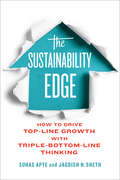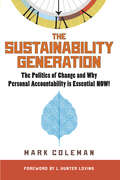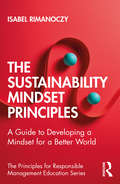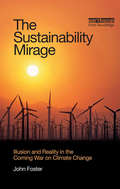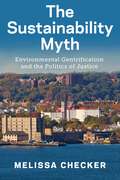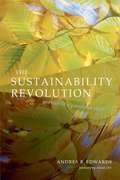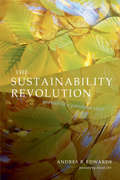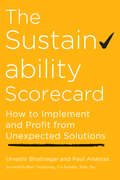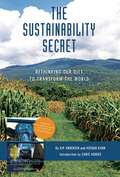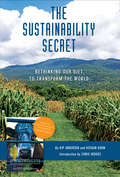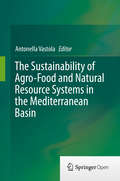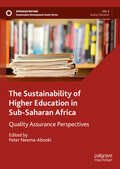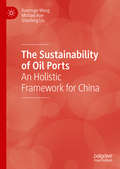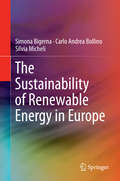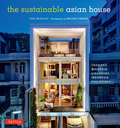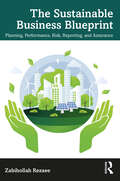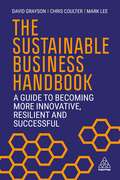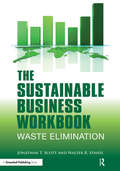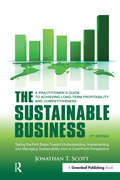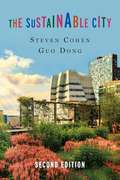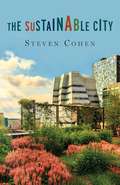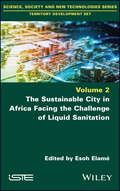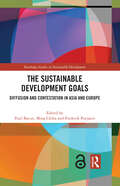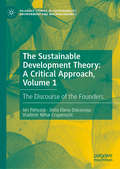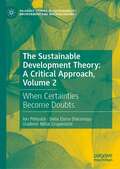- Table View
- List View
The Sustainability Edge: How to Drive Top-Line Growth with Triple-Bottom-Line Thinking
by Philip Kotler Jagdish Sheth Bob Willard Suhas ApteBusiness leaders need to embrace sustainability in order to ensure the lasting success of their organizations. Co-authors Suhas Apte and Jagdish Sheth bring their expertise from practice and from academic to illustrate how business leaders can embed sustainability in a truly holistic and transformative way. Through an examination of such companies as Walmart, AT&T, IKEA and the Tata Group, Apte and Sheth have developed a proven and actionable framework rooted in the real world success of these companies. The case studies reveal how business leaders proactively engage, energize and promote market sustainability to all of their stakeholders including customers, employees, suppliers, investors and the government. The Sustainability Edge enables companies to critically engage their stakeholders and influence them to accept sustainability as part of their core mission.
The Sustainability Generation
by Mark C. ColemanLife on Earth is increasingly at risk. What to do about rescuing our planet, and ourselves, is a growing concern for people of all ages and all walks of life. Mark C. Coleman's groundbreaking book, The Sustainability Generation: The Politics of Change and Why Personal Accountability is Essential NOW! takes a cold, hard look at the facts about where we stand and how to move forward. The Sustainability Generation is beyond simply another "green" book in that it focuses on the poisonous influence of our acquisitive culture and its root cause --entitlement. Our culture of entitlement encourages the belief that instant gratification is our right; this in turn erodes our sense of duty toward anything outside of these immediate desires. Our consumption habits are out of control and they are sabotaging our destiny. In response to this, Mr. Coleman argues that nurturing our sense of personal responsibility, and squashing our hunger for more "stuff" is the single most important step toward saving our world for future generations. The "Baby Boomer" generation is retiring and the so-called "Generation Y" will soon receive the largest transfer of wealth in history. It is vital to emphasize the need for replacing our entitlement culture with sustainable growth through redefining our core values. The Sustainability Generation provides a clear roadmap of how individuals can empower and enlighten themselves and their peers. A new "Sustainability Generation" that is committed to environmental and social change will offer the promise of the greatest legacy possible--a future!
The Sustainability Mindset Principles: A Guide to Developing a Mindset for a Better World (The Principles for Responsible Management Education Series)
by Isabel RimanoczyAs we increase our awareness of the planetary challenges and how they intersect with the discipline or profession we choose to focus on, we have put our attention on the external forces and impacts. What remains untouched however is the set of beliefs, values, assumptions, mental processes, and paradigms that we hold and share: our mindset. But how do we change a mindset? This book is the first to introduce the 12 Principles for a Sustainability Mindset, presenting educators with a framework that makes it easy to include them into teaching plans and lessons of any discipline. Written in a very clear and practical way, the book provides examples, checklists, tips, and tools for professionals and educators. It transforms the development of a much-needed mindset for sustainability into an accessible, fun and intuitive task. The book is written with educators from a variety of disciplines in mind, including but not limited to management educators, coaches, and trainers. No other book comes close to providing such a well-organized and solid way of starting to shift our mindsets in the direction of sustainability.
The Sustainability Mirage: Illusion and Reality in the Coming War on Climate Change
by John Michael Foster?This thoughtful and original study throws important critical light on the dominant orthodoxies about sustainable development, and suggests a radically new direction. Foster argues compellingly that present approaches embody floating standards and bad faith, trapping societies into inaction. I suspect this is a seminal piece of work.? Professor Robin Grove-White, former Chair of Greenpeace UK ?We all have a nagging concern that what international corporations and governments term 'sustainable' is not sustainable at all. John Foster?s clear and beautifully written text shows the deep flaws in current approaches and proposes a reassessment of what true sustainability really implies.? Chris Goodall, Chair of Dynmark International and author of How to Live a Low-Carbon Life ?This comprehensive and yet very readable book will go a long way towards puncturing some of the glib environmentalisms of our moment, and perhaps towards helping us imagine deeper and more thoroughgoing alternatives that might actually work!? Bill McKibben, author of Deep Economy and The End of Nature 'Brilliantly and ironically written, this book shades a bright light on most foggy areas around the concept of sustainability. Those fastidious obscure points do not fit properly in the reassuring technical solutions to Climate Change. Foster puts a name on those shapeless shadows that inevitably induce the sensation of something being wrong.' Italian Insider Sustainable development thinking got environmental issues onto the agenda but it may now be stopping us from taking serious action on climate change and other crucial planetary issues. Sustainable development?s attempted deal between present and future will always collapse under the pressure of ?now? because the needs of the present always win out. Inevitably, this means movable targets and action that will always fall short of what we need. Ultimately, sustainable development is the pursuit of a mirage, the politics of never getting there. To escape the illusion, we must break through to a new way of understanding sustainability by focusing on the deep needs of the present, not slippery obligations to the future. Rising to the carbon challenge now, not trying to micro-manage the longer term. Looking to the science for orders of magnitude and direction, not a gameplan. Harnessing the short-term dynamics of capitalism to the cause of learning our way forward. This book outlines an alternative to the mainstream and offers the kind of bold new thinking on energy usage, governance, education and the role of enterprise that we need to win the coming war on climate change.
The Sustainability Myth: Environmental Gentrification and the Politics of Justice (New Directions In Sustainability And Society Ser.)
by Melissa CheckerWINNER OF THE 2021 DELMOS JONES AND JAGNA SHARFF MEMORIAL PRIZE FOR THE CRITICAL STUDY OF NORTH AMERICA!Uncovers the hidden costs and contradictions of sustainable policies in an era driven by real estate developmentFrom state-of-the-art parks to rooftop gardens, efforts to transform New York City’s unsightly industrial waterfronts into green, urban oases have received much public attention. In The Sustainability Myth, Melissa Checker uncovers the hidden costs—and contradictions—of the city’s ambitious sustainability agenda in light of its equally ambitious redevelopment imperatives.Focusing on industrial waterfronts and historically underserved places like Harlem and Staten Island’s North Shore, Checker takes an in-depth look at the dynamics of environmental gentrification, documenting the symbiosis between eco-friendly initiatives and high-end redevelopment and its impact on out-of-the-way, non-gentrifying neighborhoods. At the same time, she highlights the valiant efforts of local environmental justice activists who work across racial, economic, and political divides to challenge sustainability’s false promises and create truly viable communities.The Sustainability Myth is a cautionary, eye-opening tale, taking a hard—but ultimately hopeful—look at environmental justice activism and the politics of sustainability.
The Sustainability Revolution: Portrait of a Paradigm Shift
by Andres R. EdwardsThis book analyzes the sustainability of the five major sectors of society - government, business, ecology, resources and conservation. It explains innovative projects and policies.
The Sustainability Revolution: Portrait of a Paradigm Shift
by Andres R. Edwards David W. OrrSustainability has become a buzzword in the last decade, but its full meaning is complex, emerging from a range of different sectors. <P><P>In practice, it has become the springboard for millions of individuals throughout the world who are forging the fastest and most profound social transformation of our time--the sustainability revolution. The Sustainability Revolution paints a picture of this largely unrecognized phenomenon from the point of view of five major sectors of society: Community (government and international institutions)Commerce (business)Resource extraction (forestry, farming, fisheries etc.)Ecological design (architecture, technology)Biosphere (conservation, biodiversity etc.) The book analyzes sustainability as defined by each of these sectors in terms of the principles, declarations and intentions that have emerged from conferences and publications, and which serve as guidelines for policy decisions and future activities. Common themes are then explored, including: An emphasis on stewardshipThe need for economic restructuring promoting no waste and equitable distributionAn understanding and respect for the principles of natureThe restoration of life formsAn intergenerational perspective on solutions Concluding that these themes in turn represent a new set of values that define this paradigm shift, The Sustainability Revolution describes innovative sustainable projects and policies in Colombia, Brazil, India and the Netherlands and examines future trends. Complete with a useful resources list, this is the first book of its kind and will appeal to business and government policymakers, academics and all interested in sustainability.
The Sustainability Scorecard: How to Implement and Profit from Unexpected Solutions
by Urvashi Bhatnagar Paul AnastasUsing a rigorous, straightforward scorecard as a guide, this book shows business leaders and innovators how to create breakthrough sustainable products and processes that are good for the planet, human health, and profits. Natural resource inputs to business operations are getting scarcer and more expensive, while climate-change-related economic shocks pose a risk to seamless operations and, more importantly, threaten business continuity. How can organizations integrate sustainable design in their overarching operations and align it with profitability and corporate strategy? Based on Paul Anastas's foundational Twelve Principles of Green Chemistry, the Sustainability Scorecard is the first scientifically rooted, data-driven methodology for creating inherently sustainable and profitable products and processes. By redesigning with sustainability as a key design element, firms open themselves to unexpected solutions, leapfrog innovations, and sources of value that simply don't occur when sustainability is leveraged purely as a risk-avoidance and compliance measure. Urvashi Bhatnagar and Anastas offer dozens of examples of how sustainable operations can yield benefits such as expanding market share, creating new service lines, and transforming supply-chain and sourcing models to drive the most consistent and highest long-term value. With this comprehensive framework, your firm will be able to identify truly innovative, inherently sustainable products as opposed to less bad products and processes that don't provide the exponential value that only breakthrough products can.
The Sustainability Secret
by Chris Hedges Kip Andersen Keegan KuhnThe groundbreaking 2014 documentary Cowspiracy presents shocking truths about the effects of industrial animal agriculture on the planet. The leading cause of deforestation, rainforest destruction, greenhouse gas production, water consumption and pollution, habitat loss, species extinction, ocean dead-zones, topsoil erosion, and a host of other environmental ills, animal agriculture is the biggest issue facing the planet today and one of the most controversial environmental secrets in the world of conservation.Filled with anecdotes, statistics, research, interviews with the filmmakers and contributors, and unabridged transcripts from the film, this companion book supplements and expands upon the documentary in every way. With all this and more, The Sustainability Secret reveals the absolutely devastating environmental impact large-scale factory farming has on our planet and offers a path to global sustainability for a growing population.
The Sustainability Secret: Rethinking Our Diet to Transform the World
by Kip Andersen Keegan KuhnThis companion to the documentary Cowspiracy explores the devastating environmental impacts of animal agriculture—and new paths to sustainability. The 2014 documentary Cowspiracy presented alarming truths about the effects of animal agriculture on the planet. One of the leading causes of deforestation, greenhouse gas production, water use, species extinction, ocean dead-zones, and a host of other ills, animal agriculture is a major threat to the future of all species, and one of the environmental industry&’s best-kept secrets.The Sustainability Secret expands upon Cowspiracy in every way. In this updated volume, the film&’s co-creators reveal shocking new facts and interview the leaders of businesses, environmental organizations, and political groups about the disastrous effects of animal agriculture. Extended transcripts, updated statistics, tips on becoming vegan, and comprehensive reading lists provide an in-depth overview of this planetary crisis and demonstrate effective ways to offset the damage.
The Sustainability of Agro-Food and Natural Resource Systems in the Mediterranean Basin
by Antonella VastolaThis book is focused on the challenges to implement sustainability in diverse contexts such as agribusiness, natural resource systems and new technologies. The experiences made by the researchers of the School of Agricultural, Forestry, Food and Environmental Science (SAFE) of the University of Basilicata offer a wide and multidisciplinary approach to the identification and testing of different solutions tailored to the economic, social and environmental characteristics of the region and the surrounding areas. Basilicata's productive system is mainly based on activities related to the agricultural sector and exploitation of natural resources but it has seen, in recent years, an industrial development driven by the discovery of oil fields. SAFE research took up the challenge posed by market competition to create value through the sustainable use of renewable and non-renewable resources of the territory. Moreover, due to its unique geographical position in the middle of the Mediterranean basin, Basilicata is an excellent "open sky" laboratory for testing sustainable solutions adaptable to other Mediterranean areas. This collection of multidisciplinary case studies and research experiences from SAFE researchers and their scientific partners is a stimulating contribution to the debate on the development of sustainable techniques, methods and applications for the Mediterranean regions.
The Sustainability of Higher Education in Sub-Saharan Africa: Quality Assurance Perspectives (Sustainable Development Goals Series)
by Peter Neema-AbookiThis book delves into the role of higher education as a means of sustainable development in Sub-Saharan Africa. Contributions from across the region examine the strategies and technological advances available to enable students to deal with an uncertain future and are organised under two key themes: Curriculum and Teaching and Higher Education and Innovations. The volume brings together theoretical and practical perspectives, relating them to international benchmarks while maintaining the specificities of the African context. It will be of interest to students and scholars as well as practitioners whose work interrogates higher education, quality assurance, and sustainable development goals.
The Sustainability of Oil Ports: An Holistic Framework for China
by Michael Roe Shaofeng Liu Xuemuge WangThis book provides an original analysis of the problems of ensuring that oil ports are sustainable in the broadest sense of the concept including environmental, social, technical and resource aspects. Taking China as its frame for analysis, chosen because of the authors’ expertise and because it is the largest oil import country in the world, much of it by ship, it presents a detailed investigation of the issues that make up a sustainable port profile, using a variety of established statistical and operational techniques These are examined before an holistic model is derived. Recommendations are provided for future application both in China and elsewhere and also a range of ways suggested for how the framework could be adapted to other types of ports and locations.
The Sustainability of Renewable Energy in Europe
by Simona Bigerna Carlo Andrea Bollino Silvia MicheliThis book demonstrates that the much-needed global shift in energy production and use must happen at a territorial level in order to be truly successful and sustainable. This book enables regional implementation efforts by connecting broad EU environmental policies with plans for action at the territorial level, analysing efficient resource allocation and cost effectiveness to achieve national objectives. Each EU Member State is considered in depth, in order to identify the opportunities and challenges of this regional approach. The regional dimension of the authors' analysis refers to the territorial level NUTS 1 (Nomenclature of Territorial Units for Statistics) that, starting from the administrative borders of the EU countries, divides the territory into 97 regions on the basis of major socio-economic characteristics. Because the model of the EU "green economy" is characterized typically by top-down interventions that focus exclusively on the resource productivity and investment business, its practical implementation can be de-railed. This book provides the pivotal missing piece- the detailed territorial comparative analysis necessary to obtain an optimal energy mix of renewable energy sources (RES), energy conservation and energy efficiency characteristics of each specific local context.
The Sustainable Asian House
by Masano Kawana Paul McgillickToday's byword is sustainability, and in few arenas is that more evident than in architecture. The Sustainable Asian House celebrates the new architectural vocabulary of environmental, social, and cultural sustainability as it is now emerging in Southeast Asia, specifically Thailand, Malaysia, Singapore, Indonesia, and the Philippines.The houses in this book are an exciting representation of the region's reinterpretation of tropical architecture and its growing interest in traditional materials and craftsmanship. There is a new emphasis on fresh air, natural light, and spatial variety. Designers are considering issues such as orientation to the sun and prevailing winds to reduce energy consumption and carbon footprint. The twenty-seven houses are featured in this fascinating and stunningly photographed study.
The Sustainable Business Blueprint: Planning, Performance, Risk, Reporting, and Assurance
by Zabihollah RezaeeUnderstanding how to build and manage a sustainability business plan has become a business imperative as investors demand, regulators require, and stakeholders increasingly expect companies to report their financial economic sustainability performance (ESP) and non-financial environmental, social, and governance (ESG) sustainability information. This book provides both the rationale for and key practical steps in how to approach business sustainability factors of planning, performance, risk, reporting, and assurance.This comprehensive book covers all the areas that a business would need to embed, articulate, and execute a strategy of profit-with-purpose in promoting shared value creation for all stakeholders. It addresses drivers, sources, and international guidelines (GRI, IIRC, SASB, FASB, PCAOB, IAASB, ISSB) for prioritising business sustainability factors, and establishing the link between ESG performance and financial performance. It presents key performance indicators (KPIs) of ESP and ESG dimensions of sustainability performance. It also provides templates for performance, risk, and disclosure; presenting cases and examples of why to disclose ESG performance, what to disclose, and where and how to disclose ESG performance information.For businesses wanting a detailed understanding of how to deliver on these important areas, including boards of directors, senior management, financial officers, internal auditors, external auditors, legal counsel, investors, and regulators, this book is an invaluable resource.
The Sustainable Business Handbook: A Guide to Becoming More Innovative, Resilient and Successful
by David Grayson Chris Coulter Mark LeeThe case for business sustainability has already been made; organizations can no longer ignore the issue when climate change affects supply chains and customer expectations require them to take action. It has also been proven that businesses operating sustainably drive innovation, build brand value and are more profitable.It is therefore time to shift the conversation from the 'why' of business sustainability to the 'how'. The Sustainable Business Handbook is a practical 'how-to' guide which aims to demystify jargon and provide practical tools and tips for busy managers. Rather than preaching the importance of sustainability, it cuts straight to how businesses can become more resilient and successful in the long term by becoming more sustainable.This indispensable book is based around twenty top tips for transforming your business and is interspersed with a range of individual profiles and case studies of organizations successfully embracing sustainability. With guidance on defining your organizational purpose, engaging stakeholders and creating the right culture, The Sustainable Business Handbook outlines how to shift Corporate Responsibility from being a bolt-on to business operations to being a source of innovation and new business, as well as societal good.
The Sustainable Business Workbook: A Practitioner's Guide to Achieving Long-Term Profitability and Competitiveness
by Jonathan T. Scott Walter R. StahelWhether you are undertaking the exercises for your own purposes or with the intent of completing a certification course in sustainable development, this workbook will be of help. The companion text for this publication is The Sustainable Business: A Practitioner's Guide to Achieving Long-Term Profitability and Competitiveness (2nd edition). Read the companion text thoroughly before beginning this workbook. Follow a step-by-step approach using the 7-P Roadmap to Sustainability Model and work your way through the seven sections that comprise the companion text (Preparation, Processes, Preservation, People, Place, Product and Production). This workbook focuses on Waste Elimination. A forthcoming workbook will focus on Resource Extension. This workbook will increase your knowledge and understanding, subject-specific skills and personal and transferable skills.
The Sustainable Business: A Practitioner's Guide to Achieving Long-Term Profitability and Competitiveness
by Jonathan T. ScottThis is the 2nd edition of The Sustainable Business (2010), winner of The President's Award for Excellence in a Published Body of Work at Kozminski University, Poland. Recommended for managers, employees, teachers and students, this readable and informative guide explains the importance of waste minimization as a first step toward sustainability. Within its pages, the breadth and depth of long-term profitable business practices are explored with an emphasis on optimizing resources (including labour and markets) and maximizing purchases and investments while eliminating the costs of non-product (waste), unemployment, short-term thinking and environmental degradation. As proof of its potency, The Sustainable Business has already been disseminated to over 1.3 million people around the world and the first edition is available in four different languages. The bottom line: if you're looking to gain insight on the future of business, this is it!
The Sustainable City
by Steven Cohen Dong GuoLiving sustainably is not just about preserving the wilderness or keeping nature pristine. The transition to a green economy depends on cities. Economic, technological, and cultural forces are moving people out of rural areas and into urban areas. If we are to avert climate catastrophe, we will need our cities to coexist with nature without destroying it. Urbanization holds the key to long-term sustainability, reducing per capita environmental impacts while improving economic prosperity and social inclusion for current and future generations.The Sustainable City provides a broad and engaging overview of the urban systems of the twenty-first century. It approaches urban sustainability from the perspectives of behavioral change, organizational management, and public policy, looking at case studies of existing legislation, programs, and public-private partnerships that strive to align modern urban life and sustainability. The book synthesizes the disparate strands of sustainable city planning in an approachable and applicable guide that highlights how these issues touch our lives on a daily basis, including the transportation we take, the public health systems that protect us, where our energy comes from, and what becomes of our food waste.This second edition of The Sustainable City dives deeper into the financing of sustainable infrastructure and initiatives and puts additional emphasis on the roles that individual citizens and varied stakeholders can play. It also reviews current trends in urban inequality and discusses whether a model of sustainability that embraces a multidimensional approach to development and a multistakeholder approach to decision making can foster social inclusion. It features many more examples and new international case studies spanning the globe.
The Sustainable City
by Steven CohenLiving sustainably is not just about preserving the wilderness or keeping nature pristine. The transition to a green economy depends on cities. For the first time in human history, the majority of the people on the planet live in urban areas. If we are to avert climate catastrophe, we will need our cities to coexist with nature without destroying it. Many places are already investing in the infrastructure of the future—including renewable energy, energy efficiency, mass and personal transit, and advanced sewage and waste management—but the modern city still has a long way to go.In The Sustainable City, Steven Cohen provides a broad and engaging overview of the urban systems of the twenty-first century, surveying policies and projects already under way in cities around the world and pointing to more ways progress can be made. Cohen discusses the sustainable city from an organizational-management and public-policy perspective that emphasizes the local level, looking at case studies of existing legislation, programs, and public-private partnerships that strive to align modern urban life and sustainability. From waste management in Beijing to energy infrastructure in Africa to public space in Washington, D.C., there are concrete examples of what we can do right now. Cohen synthesizes the disparate strands of sustainable city planning in an approachable and applicable guide that highlights how these issues touch our lives on a daily basis, whether the transportation we take, where our energy comes from, or what becomes of our food waste. Providing recommendations and insights with immediacy and relevance, this book has invaluable lessons for anyone seeking to link public policy to promoting a sustainable lifestyle.
The Sustainable City in Africa Facing the Challenge of Liquid Sanitation
by Esoh ElaméThis book questions the role of liquid sanitation in the development of cities in Africa. The absence of sewerage networks and treatment plants in African cities already submerged by rapid and anarchic urbanization is a major problem. To meet this challenge, it is urgent to rethink urban water governance and impose and enforce sustainable urban planning standards. In other words, sanitation issues must now be placed at the heart of urban planning.
The Sustainable Development Goals: Diffusion and Contestation in Asia and Europe (Routledge Studies in Sustainable Development)
by Paul Bacon Frederik Ponjaert Mina ChibaThere have been significant efforts to implement the Sustainable Development Goals (SDGs) at multiple levels of governance across all regions of the world. However, the manner in which the global governance norms underlying the SDGs are actually being diffused is under-researched and not well understood. This book considers the promotion of the SDGs through the lens of norm diffusion theory, with a focus on three SDG policy areas; health, education and decent work. A distinctive feature of the book is that it offers multiple original case studies of SDG norm diffusion involving Asian and European actors. A unique feature is that the case studies in the book identify relevant SDG norm senders and norm receivers, and examine the relationship between them. The book also challenges the assumption that the SDGs themselves are static and unchanging, and reveals how SDG norms are dynamic and can be reformulated as a result of contestation between norm senders and norm receivers. As well as introducing a diverse and original set of case studies, the book therefore allows readers to deepen their understandings of the policy diffusion mechanisms by which SDGs are diffused, and grasp the patterns of success and failure in the implementation of these policies.
The Sustainable Development Theory: The Discourse of the Founders (Palgrave Studies in Sustainability, Environment and Macroeconomics)
by Delia Elena Diaconaşu Vladimir Mihai Crupenschi Ion PohoațăThis book argues that the theory of sustainable development lost some of its rigor because of two main reasons. The first manifests itself as an inflation of concepts that hampers the correct understanding of sustainability’s essence. The second one consists of a departure from the traditional scientific sources of the classicists and, in part, neoclassicists. Exploiting relevant areas of their works, the authors outline the theoretical framework necessary to promote a healthy version of sustainability. Of utmost interest prove to be areas such as: the formation process of natural prices and natural rate of interest; placing growth before employment and placing production before distribution, consumption, and social justice. The main idea of the book consists of a call for breaking away from the impure forms of the theory of sustainable development and its reconstruction through the reconciliation with the laws of healthy growth as they are highlighted in the works of the founders. The authors make the case for an approach to sustainable development that is holistic, macroeconomic, and institutionalist, where social, ecological, and economic components are reconciled. This work presents a fresh perspective in the context of current works on sustainability, serving as an accessible research resource and public policy decision guide.
The Sustainable Development Theory: When Certainties Become Doubts (Palgrave Studies in Sustainability, Environment and Macroeconomics)
by Ion Pohoaţă Delia Elena Diaconaşu Vladimir Mihai CrupenschiThis book explores the present conflictual relationship between the economy, the environment, and society. The current mainstream economic model is analysed from the perspective of the founding economists to review its suitability to tackle issues of sustainable development. The problems of redistribution and social justice are debated at length; alongside those concerning the giant state, degrowth, and a vision of sustainability that is founded on the idea of a self-regulating free market economy. Business cycle sustainability, anti-crisis therapy, technological unemployment, the natural rate of interest, and the Bruntland matrix are also examined.This book aims to present a holistic approach to sustainable development where social, ecological, and economic components are balanced. It will be relevant to students and researchers interested in this topic.
